Losing My Religion
News Based on facts, either observed and verified directly by the reporter, or reported and verified from knowledgeable sources.
Candid conversations with local millennials about their faith in…their faith

Good morning! Today is Monday, June 13, and you are reading today’s section of Examiner+, a digital newsmagazine serving Westchester, Putnam, and the surrounding Hudson Valley.
[Editor’s note: Today’s story was inadvertently sent out yesterday, a day early. In case you missed it here is another opportunity to read this fantastic story by Erin Maher.]
Need to subscribe — or upgrade your Examiner+ subscription to enjoy full access to all of our premium digital content? Take advantage of our special FREE TRIAL OFFER.
Take Examiner+ on a test drive today at NO CHARGE for a full month. Enjoy full membership-level access to all of our premium local content, delivered straight to your inbox six times a week.
Today’s Examiner+ is sponsored by Caramoor.

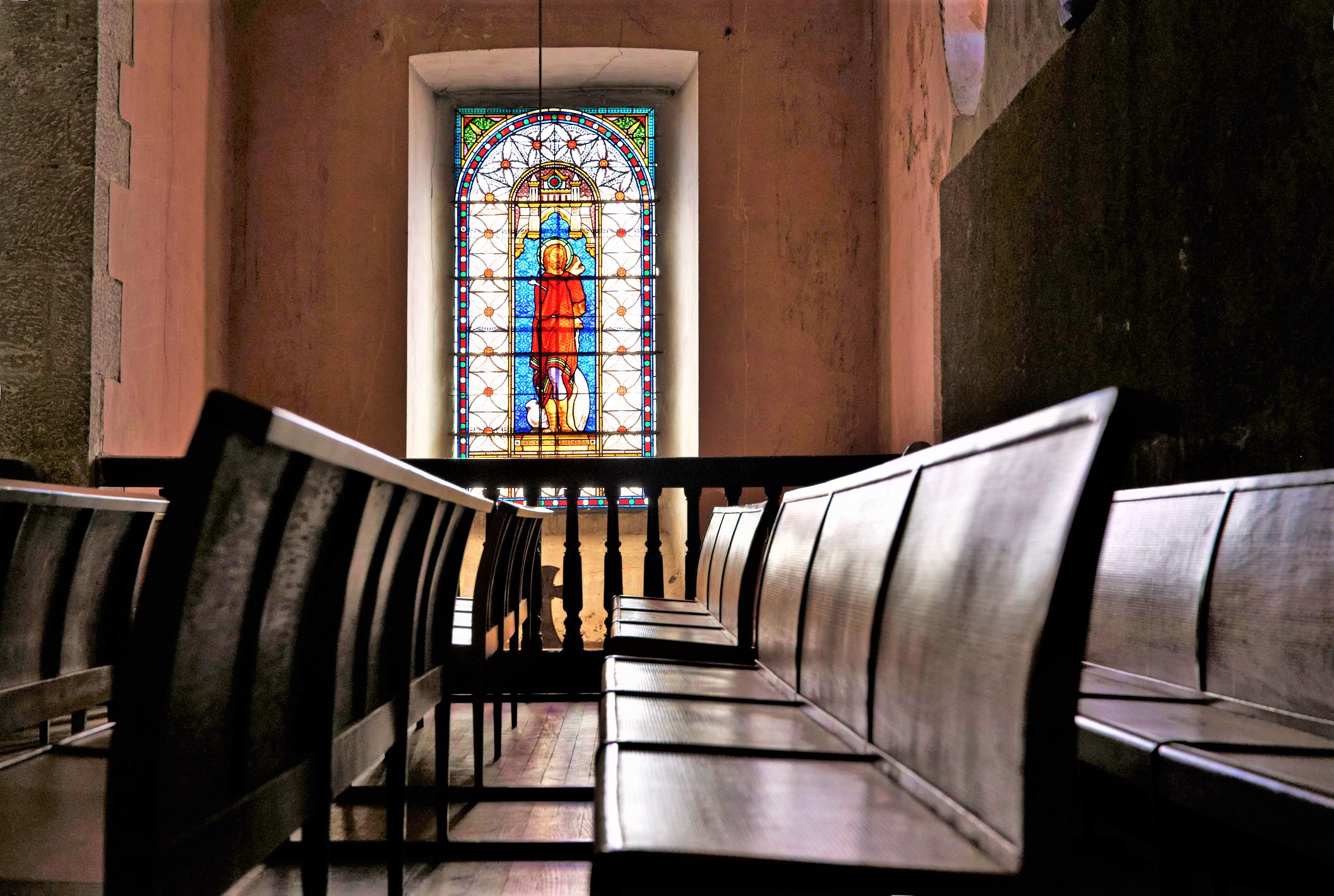
[This article was corrected on June 12 at about 3:00 p.m. See correction details at the end of the article.]
Sunday service once meant wearing your finest frock to attend weekly religious worship with family. For the millennial generation, that Sunday service is more likely to be spent bowing down to the almighty brunch rather than quiet contrition in a church.
Americans who have identified with a religious affiliation have continued to steadily decline in recent years, with millennials proving to be the most significant generational drop-off from religion. According to a report from the Pew Research Center, one in four members of the Millennial generation is unaffiliated with any particular faith, describing their religion as “atheist,” “agnostic,” or “nothing in particular.” That’s a 12% increase from Baby Boomers who identified as “unaffiliated” and a 5% increase from Gen X.
Millennials also pale in comparison to past generations in terms of daily prayer. Less than half of millennials report praying every day, which is a significant decrease from the 61% of Baby Boomers and still less than that of Gen X, of which 56% pray every day.
So why are millennials fleeing from faith? Scandals coupled with cultural wars appear to be the prime catalysts for their waning interest in religion.
Hypocrisy, Scandals, and Greed
Millennials’ aversion to faith is not because they grew up in secular households. On the contrary, millennials actively leave the faith they learned and practiced in their youth. Nearly one in five millennials raised with religion are now unaffiliated with any particular faith. There are several reasons for millennials’ departure from their former faith.
First, millennials have witnessed major improprieties and failures of many religious institutions.
In January 2002, the Boston Globe’s Spotlight investigative reporting team broke the story of a series of sexual abuse cases of minors by Catholic priests and cover-ups by church hierarchy in the Boston Archdiocese. With sexual abuse by clergy thrust into the national spotlight, the reported cases snowballed. Subsequently, it has been found that these heinous sexual abuse cases were not just endemic to the Boston Archdiocese but were a prolific, international issue. Unfortunately, Westchester County was not safe from these scandals, either.
“If your image, if your model of authority is based on your reputation for Holiness and perfection, you can’t let people see the problems. Then you create conditions for cover-up, right? And you create a whole bunch of other dynamics that are really unhealthy,” says Dr. Colt Anderson, church historian and theologian at Fordham University in the Bronx.
“And, and you know, so then as soon as people find otherwise, then they fall away. So I think the church has set itself up in a way for the problems it’s facing.”
But Catholicism is not the only religion with widely publicized disgrace. Each week, there seems to be yet another documentary exposing the abuses of organized religion. In recent years, Scientology, popular among the Hollywood elite and founded by science fiction writer L. Ron Hubbard has been exposed as predatory and abusive. The Remnant Fellowship, a Tennessee-based Christian congregation that came to prominence through a religious weight-loss program called the “Weigh Down,” has been revealed as hypocritical, greedy, and exploitative of its congregants.
“The idea of church is flawed inherently and even more so as megachurches became a thing in the Christian religion,” says 34-year-old filmmaker Philip Prince.
Prince, who lives in Brooklyn, grew up as a Pentecostal Christian, in church every Sunday, bible study every Thursday, and youth group each Friday. As an adult, he does not regularly attend mass.
“How can God’s chosen speaker amass so much while his flock is in tatters? And it’s the same all across America. Church attendees give 10% of their income every Sunday to a church that does not do any, if at all, community outreach. The modern image of church goes against God’s own teachings in my point of view.”
Christianity has especially conflated morality with celebrity. With the genesis of technology, preachers and pastors once limited to their local congregations have reached greater audiences with nationally syndicated homilies. And thus, preachers like Joel Osteen and Billy Graham have grown to meteoric fame. With that fame comes money. A lot of money. Many of these church leaders, especially the younger ones, colloquially known as “hypepriests,” aren’t dressed in modest dressings but instead don high-fashion and expensive wear. An Instagram account, @preachersandsneakers, is devoted to exposing how expensive pastors’ latest outfits are.
https://instagram.com/p/CXkRTUPl3M-/
An Instagram post from “@preachersandsneakers” reveals the $2,500 price tag of one minister’s fancy footwear.
“I think most millennials feel betrayed by religion. Their relationship with it is usually with the abusive way it is used by greedy psychopaths,” says 31-year-old William Smith, who grew up in Westchester and identifies as a Presbyterian Christian.
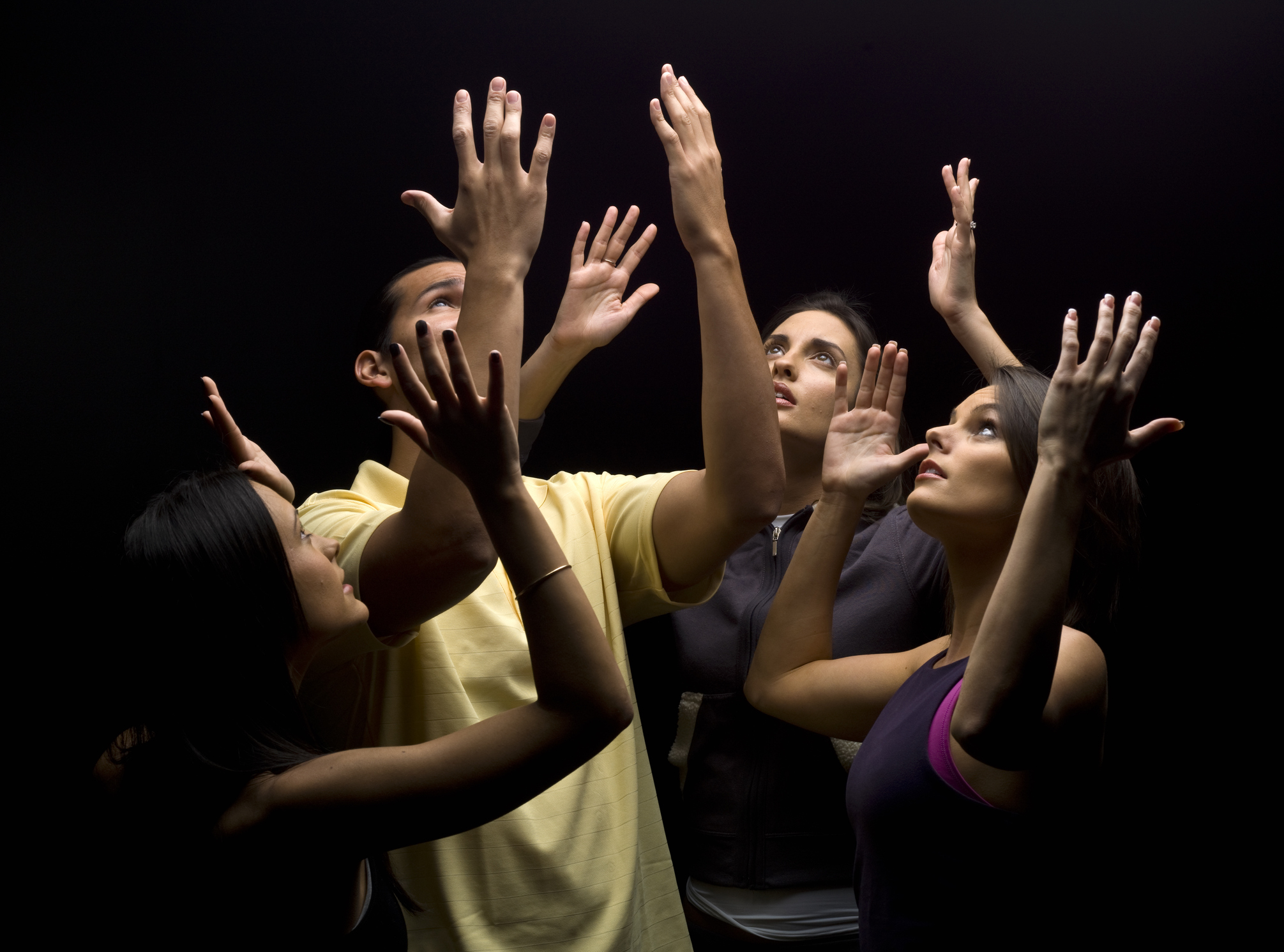
Progressive Minds at Odds with Traditional Values
Many millennials do not share the same beliefs as many churches, particularly older institutions.
“We’ve modernized and have different beliefs; the church never did,” says 34-year-old Christina Kearns, who identifies as Catholic.
“They are still very old-fashioned with their beliefs. That fact that there are not many millennials that want to commit time, energy, and money into things that have different beliefs, I can totally see it.”
In some religions, women and men do not have parity. For example, in the Catholic church, nuns cannot perform mass; only priests can. A study called “Catholic Women in the United States,” commissioned by American Magazine, conducted by the Center for Applied Research in the Apostolate at Georgetown University, surveyed over 1500 American women who identify as Catholic. The 2018 survey showed that six in ten women supported the possibility for women ages 35 and older to be ordained as permanent deacons.
Additionally, some religions are staunchly against abortion and contraception.
Another major issue that millennials and the church do not agree on is the acceptance and affirmation of the LGBTQ+. Almost twice as many millennials say homosexuality should be accepted by society as opposed to older generations, and 65% of millennials support nondiscriminatory laws that protect the LGBTQ+ community.
Today’s supporting sponsor is Dana Levenberg for New York Assembly.
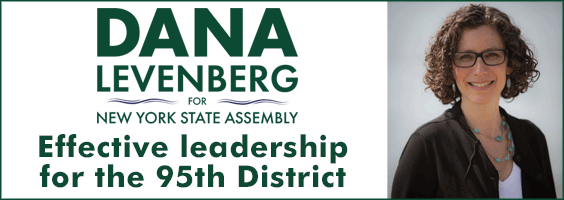
The Desire and Role of Religion in the Lives of Millennials
Despite millennials leaving the church, this doesn’t mean they don’t have a desire for spirituality or some of the principles espoused by the church.
Of the seven millennials Examiner+ interviewed, four of which do not regularly attend services of the religion they identify with, still say faith is important to them.
“The faith placed in me did not leave as I grew up. Merely my relation to church as a method of religious organizing,” says Prince.
“It’s a founding aspect of my perspective on the world,” says Smith on his faith.
New York City resident Liz Kobak, 33, does not attend service regularly but finds that her faith is important to her, “It creates a foundation for how I want to live my life. I think there are certain things that you have to uphold yourself to; you can’t just run around doing whatever you want in this world. I think there’s a higher power that you have to report to. I think it keeps you grounded, keeps you accountable for your actions, and it’s just a great way of feeling grateful, I think, for what we have in life.”
Kobak, a Communications professional, was recently wed in a Jewish ceremony. She also plans on raising her children in Judaism, “We plan to raise our kids in the Jewish faith. And I think that they would probably be a part of Hebrew school. They would be encouraged to become Bar and Bat Mitzvahed. Then hopefully, we can attend services together, probably at a reform Temple.”
For some, having children serves as an impetus to become reacquainted with faith.
“Growing up, my exposure to religion is that my mother forced me to go to church every single Sunday,” says Putnam Valley resident Kearns, who grew up in Westchester.
“The faith placed in me did not leave as I grew up. Merely my relation to church as a method of religious organizing.” — Philip Prince, 34
Kearns even attended Catholic school for two years. Eventually, she was old enough that she wasn’t forced to go to church anymore and found that she was not religious. But that changed when she had children, “I wanted them to have good morals and values. When you become an adult, your viewpoint on life changes.”
Kearns sons, ages 14 and 4, both attend Catholic school. And while they may not attend church weekly, worship is practiced in her home, “We pray daily. We may not go to church daily, but we pray every night while my husband is at work. I pray. I pray for his safety that he comes home. I pray that my boys will have a father growing up and that they will continue on a good path and make the right decisions and hope that they have a long life.”
Millennial Religious Leaders
With the decline of Americans who affiliate with a religion, so too has the number of religious leaders throughout the country.
According to Religion News Service, Jewish Conservative synagogues are currently experiencing a shortage of rabbis.
American Catholic priests and nuns have seen a significant decrease in numbers over the last few decades. There are fewer than 36,000 U.S. priests, a nearly 40% decrease in the priest population since 1970. Nuns have seen an even greater drop at a 72% decrease. In 1965, there were approximately 180,000 nuns in the U.S. In 2014, that number was only 50,000.
But, for those millennials affiliated with a religion, the intensity of their religious affiliation is as strong today as previous generations in their youth. And some millennials do feel the call to devote their lives to their faith.
One of them is Father Stephen Robbins, who graduated in May from St. Joseph’s Seminary in Yonkers. Father Robbins, originally from Blackwood, New Jersey, grew up in a household that attended Catholic church weekly. His mother also aided in music ministry in their parish.
“Outside of our weekly attendance of masses at church, we weren’t an overly religious home either,” says Father Robbins.
“I think in my earliest years, it was more so the practice of religion, as opposed to a full-life, pervaded by faith.”
Father Robbins attended Catholic school and was an altar server at his parish. He had briefly entertained the idea of entering the priesthood in high school but would often push it aside. After he graduated high school, Father Robbins attended a secular college, Drexel University, in Philadelphia, where he was a member of the rowing team. Even with a full academic and athletic schedule, he still felt that something was missing.
Father Robbins attended a discernment meeting at his local parish during Christmas break his freshman year. Priests participate in these meetings to discuss the process of becoming a priest with young men who are considering joining the priesthood. After finishing his second and what turned out to be his final semester at Drexel, Father Robbins entered the seminary.
“As soon as I went into the seminary, I loved it. I was just flooded with that sense of peace, that sense of belonging, that sense of purpose. This is where I’m supposed to be.”
However, before Father Robbins entered seminary, he had trepidation about telling his friends about his major life decision.
“I knew my parents would support me,” says Father Robbins. “I was a little more afraid of my friends, though, especially my college friends, who I’d grown to love very much and grown very close to because none of them really were religious.
“I thought they would see this as me throwing my life away.”
But that was not the case. Instead, Father Robbin’s friends were incredibly supportive, and in May, after seven years of seminary education, he graduated and became an ordained priest in the Catholic church.
Father Steven Gonzalez, 29, a priest at a Catholic parish in the Bronx, actually faced pushback from family when he decided to commit to the church,” I think my parents were a bit surprised and a bit upset. My mother told me she just wanted me to do whatever made me happy. It was tough on the family for a few years as I was in studies for the priesthood, a process that would take about seven years to complete. My parents were also protective of me, especially given all the recent scandals in the church. They wanted what was best for me.”
Father Steven went on to be an ordained priest but can understand fellow millennials’ doubts about religion, “I think most of my contemporaries are a bit hesitant about organized religion. Many millennials I know would say they’re more ‘spiritual than religious,’ and I can certainly understand the sentiment.
“There’s a common misconception I think in my generation that religious people are in many ways hypocritical in the way they act, and often in the news, we see and hear of religious people doing bad things. I think often we’re turned off by that,” says Father Gonzalez.
“I would encourage millennials to explore their faith more and give it a chance.”
An Inclusive Take on Christianity
While many traditional religions are having trouble finding their footing with younger generations with more open minds, there are already churches and denominations that share progressive ideals.
Community Church of the Pelhams (CCOP) in Pelham is one of these churches.
“We have a lot more older members than younger members, but we also have some millennials and Gen Xers who are part of our congregation,” says CCOP Pastor Noel Vanek.
The CCOP, a part of the United Congregational Church, voted unanimously in 2018 to approve its Open and Affirming status. To be considered Open and Affirming, congregations must have voted to affirm and welcome LGBTQ persons into their congregations.
CCOP also recently said goodbye to their long-time Assistant Pastor, Rev. Asayo Thomas, a female. Pastor Thomas served the CCOP congregation for 25 years and had complete parity with any male pastors in the church.
Despite CCOP’s inclusivity, getting millennials to attend service has proven difficult, “I would like to say we attract millennials, but not very many,” says Pastor Vanek.
“And I don’t know a whole lot of millennials who go to church.”
But those that do come to CCOP have been enticed by the church’s large banners outside. One banner is rainbow-colored and signifies the affirmation of the LGBTQ, and the other is all black that supports the Black Lives Matter movement.
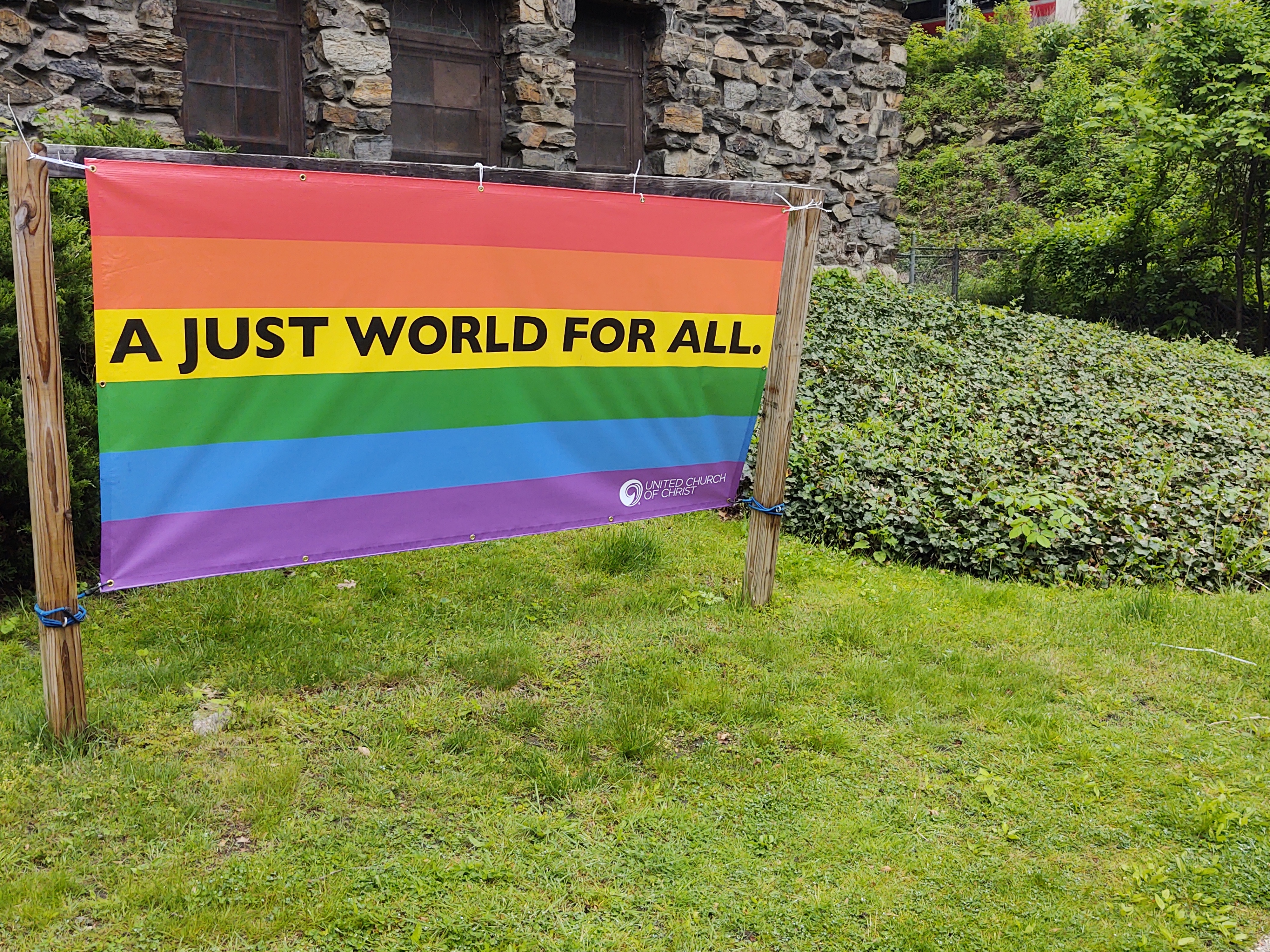
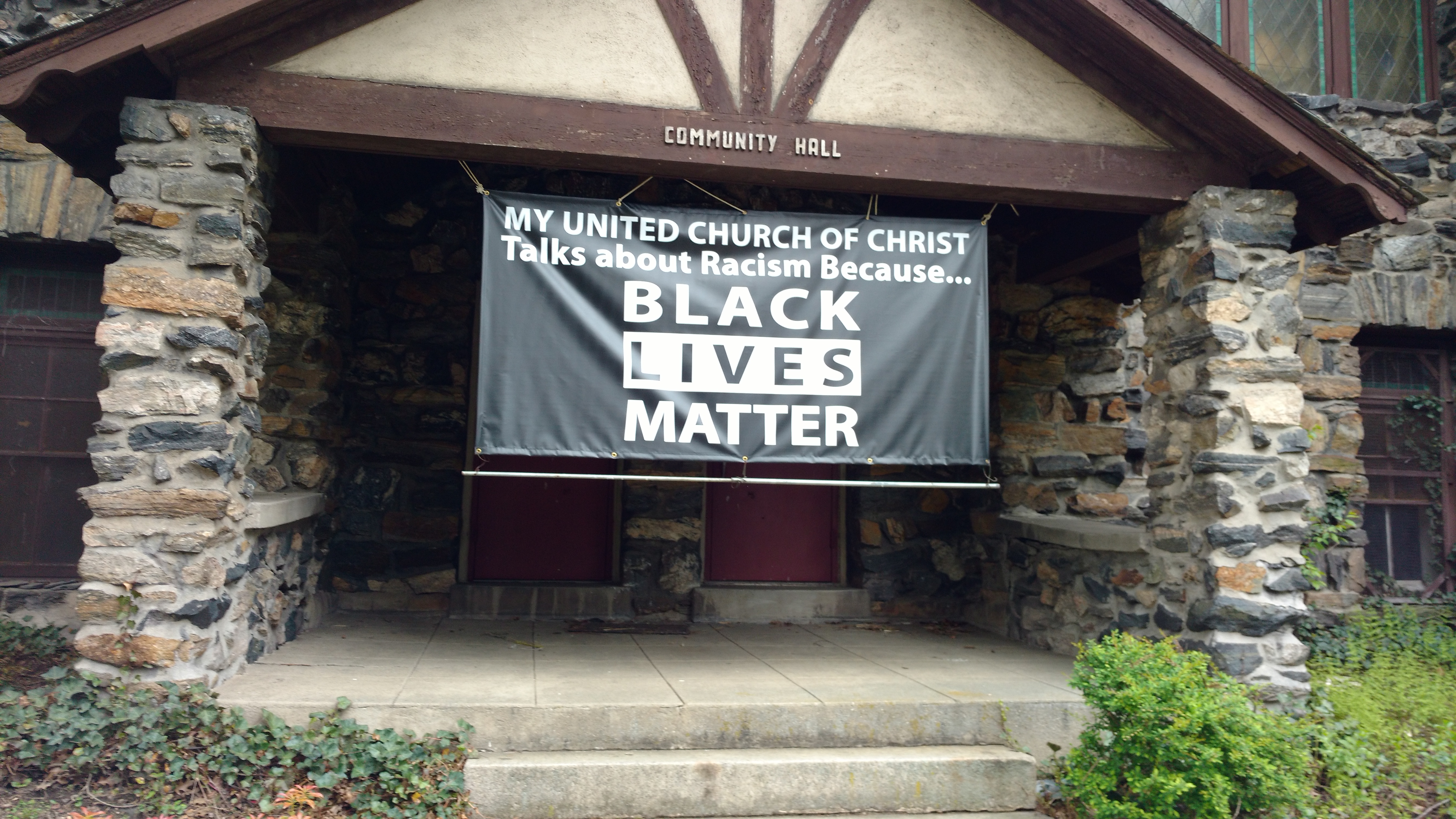
Two banners on display outside the Community Church of the Pelhams (CCOP) in Pelham.
“They [new members] come from people looking for something different, and when they pass by and see we have interesting signage, they read our website. They see that we’re, you know, not the typical Pelham church, but they have to be looking. That I think is also true,” says Pastor Vanek.
“We don’t pretend that we are the truth or have the truth as in owning it, but we are a congregation of people looking to support each other and find the truth centered around Jesus Christ, and that’s not a simple truth. Because people obviously interpret what he means in history and lots of different ways, but we think happens to be a messenger of God’s liberation and God’s loving healing,” says Pastor Vanek.
Looking Towards the Future
Many religions have welcomed technology into their weekly services, spurred by the pandemic. As a result, congregants now have a new way to attend worship and one more aligned with millennial technological prowess.
In May, the Methodist Christian denomination experienced a schism with the launch of the Global Methodist Church, a new theologically conservative denomination splintering from the United Methodist Church. This split came after decades of debate over the ordination and marriage of LGBTQ United Methodists and came to a head in 2016 when the first openly lesbian bishop was elected at a regional conference.
In the Catholic Church, Pope Francis has made more progressive statements on world issues. In 2020, he endorsed civil unions, stating, “Homosexual people have the right to be in a family. They are children of God,” Francis said in the documentary Francesco.
“You can’t kick someone out of a family, nor make their life miserable for this. What we have to have is a civil union law; that way, they are legally covered.”
But there is still a long way to go before millennials make Sunday services a recurring event on their calendar. While religions struggle to connect with millennials, it seems that millennials, while down on religion, are not entirely out.
“I think the core messages of most religions, to treat others as you’d like to be treated,” Smith says, “is pretty solid overall and worth trying to understand.”
Correction: An earlier version of this article incorrectly identified Father Stephen Robbins as a seminarian. He was a seminarian at the time of the interview but graduated and became an ordained priest by the time of publishing. We regret the error.
Erin Maher is a writer and Westchester native. She has written on a myriad of topics, including life as a millennial and tennis. When not writing, Erin can be found on the tennis and pickleball courts or lovingly scrolling through pictures of dogs on Instagram. For more of her musings, visit erinmaherwrites.com, and follow her on Instagram @erinmaherwrites and Twitter @erinmaherwrites
Examiner Media is a proud participant in The Trust Project.
CLICK HERE to review our best practices and editorial policies.
This piece is a news article. CLICK HERE to learn about our definitions for types of stories.
We welcome corrections, story ideas, and general feedback. CLICK HERE to use our actionable feedback form.

Examiner Media – Keeping you informed with professionally-reported local news, features, and sports coverage.

